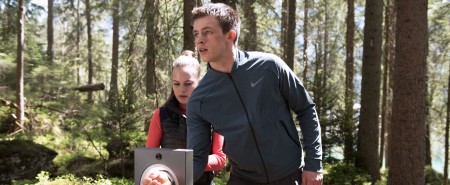-
GODLESS YOUTH/YUGEND OHNE GOTT (Alain Gsponer 2017)
ALAIN GSPONER: GODLESS YOUTH/YUGEND OHNE GOTT (2017)

ALICIA VON RITTBERG, JANNIS NIEwÖHNER IN GODLESS YOUTH
A tale still to ponder
Godless Youth, from the Swiss director Alain Gsponer, adapts, not for the first time, the 1937 novel by Ödön von Horvath that is a critique of Nazi ideology. It focuses on a special summer camp up in the Alps some time in the future where "superior" young men and women are chosen, through challenges and awarding of points, for scholarships in an elite university. Eventually we see that while this "ruling class" is being cultivated, the rest of society is treated like rubbish and lives in squalor. Meanwhile those at the top are morally corrupted and encouraged to be brutal and wind up committing crimes to stay where they are. This story may be overshadowed by more colorful Young Adult tales of competitions like "The Hunger Games" or "The Maze Runner," but it has clear points to make that are not unwelcome. You cannot blame the film for its artificiality: the point is that the mindset of National Socialism creates an unnatural environment and unhealthy behavior. Some of Gsponer's urban scenes have the bracing chill of the Berliner Schule.
The story has, or in some cases notably lacks, modern accoutrements. Contestants get a GPS unit injected at the base of the thumb to be tracked and are monitored by other gadgets, but are deprived of their electronic devises, warned that may be hard for some. The activities are simple Outward Bound ones, like crossing a raging mountain stream, climbing rocks, racing through the woods. Any five minutes of a Maze Runner movie would trump the best action sequence here. That's beside the point. What matters are the conflicts that arise among the competitors and among the people running the camp. The beauty of Godless Youth is that every moment counts and is examined and pondered. But we're kept in suspense. Mistakes or misdemeanors may be a sign of needed independence. There's the arbitrariness of a dictatorship.
The main character, by far, is the sinewy and chiseled Zach (Jannis Niewöhner), and he's assigned to share a cabin with a girl, the blonde Nadesh (Alicia von Rittberg). Zach arrives in a troubled state because his father, head of a successful company, has recently committed suicide. Loreen (Anna Maria Mühe), the psychologist, who's closest to being in charge, wants him to simply take a pill that will quell his grief, but he prefers to take comfort in keeping a diary, which was authorized earlier, but here is heavily frowned on. The climactic action will turn on the diary, and Nadesh's curiosity about it. And there will be a crime, a trial, and a surprise revelation.
The youths are warned by Loreen that there are dangerous vagrants, low-lifes, who are in the area and may steal things. Zach finds one, Eva (Emilia Schüle), a beautiful, dark-haired girl, and he starts meeting her secretly. One may wonder how this eludes the authorities.
There are other youths, notably Titus (Jannik Schümann), who is slippery, and Wladim (Damian Thüne), who is plump and rejected by the other contestants as unfit. But the key character next to Zach is Lehrer, (Fahri Yardim), a teacher (but does he teach?) who has a penchant for siding with underdogs in the group. He champions Zach, and later Wladim, but to his peril.
The weakness of the film structurally is that while it spends most of its time on events at the camp, what happens afterward out in the world turns out to be more important. Nonetheless the early action is suspenseful, because it's building up an environment whose rules we don't yet understand.
The screenplay adaptation is by Alex Buresch and Matthias Pacht from Von Horvath's eponymous novel. (This may be a very free adaptation, influenced by recent films.) Though Von Horvath died only a year after publishing Jugend ohne Gott, 1938, at only thirty-six, his writing has been the basis for many recent play productions and movies. The son of an Austro-Hungarian diplomat he was a successful playwright whose strong opposition to National Socialism eventually led to trouble for him in Germany. He was killed by a falling branch in Paris, reportedly after watching a film version of Snow White, just when he was beginning conversations with the Polish German director Robert Siodmak then exiled in France, about adapting Godless Youth for the screen. A citizen contributor to IMDb reports that there have already been one French and two German film adaptations. This new one shows what compelling material Von Horvath provided. It has too good acting and production values for a mere TV movie - but TV movies can be fine sometimes, especially French ones. The French one is from 1996, by Catherine Corsini, Jeunesse sans dieu (Youth without God), and it was a French/German Arte TV movie, though it debuted under the radar at Cannes and got a favorable review by Isabelle Potel in Libération.
Godless Youth/Jugend ohne Gott, 154 mins., opened in Germany Sept. 2017, and showed at one German festival. Reviewed here as part of the San Francisco Goethe-Institut's Berlin and Beyond Festival, 9-15 Feb. 2018.
Last edited by Chris Knipp; 02-10-2018 at 01:09 PM.
 Posting Permissions
Posting Permissions
- You may not post new threads
- You may not post replies
- You may not post attachments
- You may not edit your posts
-
Forum Rules





 Reply With Quote
Reply With Quote
Bookmarks